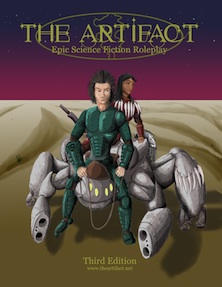RPGs are all about making choices. Players love being given agency and autonomy. This is the core draw of a table top RPG.
It may also be the reason very few people play them.
Continuing the thought from yesterday, letting your players have control of what they will do is the holy grail of good GMing. Give them what they want, let them be awesome, never say no.
This philosophy is poisoning RPGs. How can I say this? You probably have used these mantras and had your games become more enjoyable. They became more enjoyable for you, but what about that guy that tried out sitting in on the game to see if he’d like it and then didn’t come back? He’s the majority. He didn’t enjoy it and we assume he didn’t “get it.” You probably asked him why he didn’t like playing and he probably shrugged, not knowing what to say.
A lot of people see us sitting around the table and think “That’s really nerdy.” Take the same group of people and have them play a board game and people don’t think “nerdy” they think “They’re having fun.” Why?
Let’s decode this language. “Nerdy” means that the people involved are putting in more mental effort into a task than most people would. That means people are looking at people playing RPGs and saying “That’s really hard.” They don’t always want to admit that to you or themselves so they disparage it with “Nerdy”.
So why are RPGs hard? We have one page RPGs, on the level of game complexity and reading they’re simpler than most board games. If keeping track of a fantasy world is too much mental effort, there are plenty of one shot adventures, no memorization required. In all the games, no matter how simple or complex rule wise one thing that makes all of them mentally challenging.
Choice
Choice is great when you know what you want. It lets you get what you’re after. We assume that given choice people will decide on what they want. It would seem the reasonable thing wouldn’t it?
The problem is that people don’t often know what they want to do. In the context of a game, we imagine that throwing out infinite possibilities makes the game more enjoyable, and it does, for a select group of people who know what they want. For the rest of the people in the world, they sit down to a game and want to be entertained. They don’t particularly care how but having to work hard at making choices is not entertainment and they see RPGs as having to work hard.
I now recognize that this is where I’m going wrong with some of my players. I have some that know what they want out of the game. Others, just want to have fun, they’re not personally after a goal. They’ll go after a goal if you set it in front of them and it looks like it’ll be fun getting there. They wouldn’t have picked it for themselves out of the air though.
This isn’t just RPGs, it’s everything. I think this is one place that Apple Computer has really gotten things right. You offer one or two options, if you have an option that costs more (the white one) then people feel really good about themselves for choosing it.
Barry Schwartz wrote a book the Paradox of Choice. Heres a video of him talking about it.
If you don’t want the lead up skip to about 8 min to get to the core ideas.
This is also the biggest difficulty in this. Some players will enjoy the choice, others do not. Choice has to be offered to the players that do want it and the players that want to be guided need to have fewer choices. It’s not a one size fits all proposition and that makes GMing much harder. Tomorrow I’m going to try and come up with some ideas for how to handle players that want choice and players that don’t.


 The Free RPG Blog
The Free RPG Blog